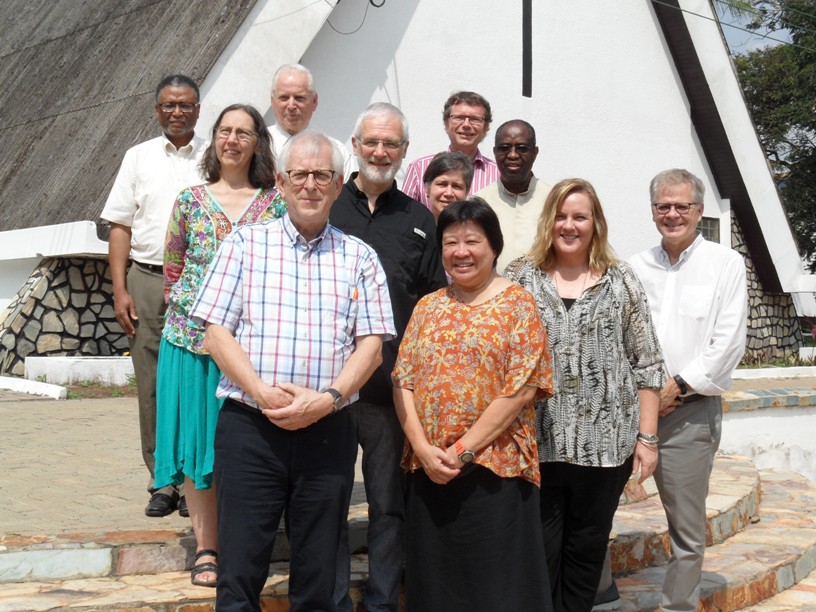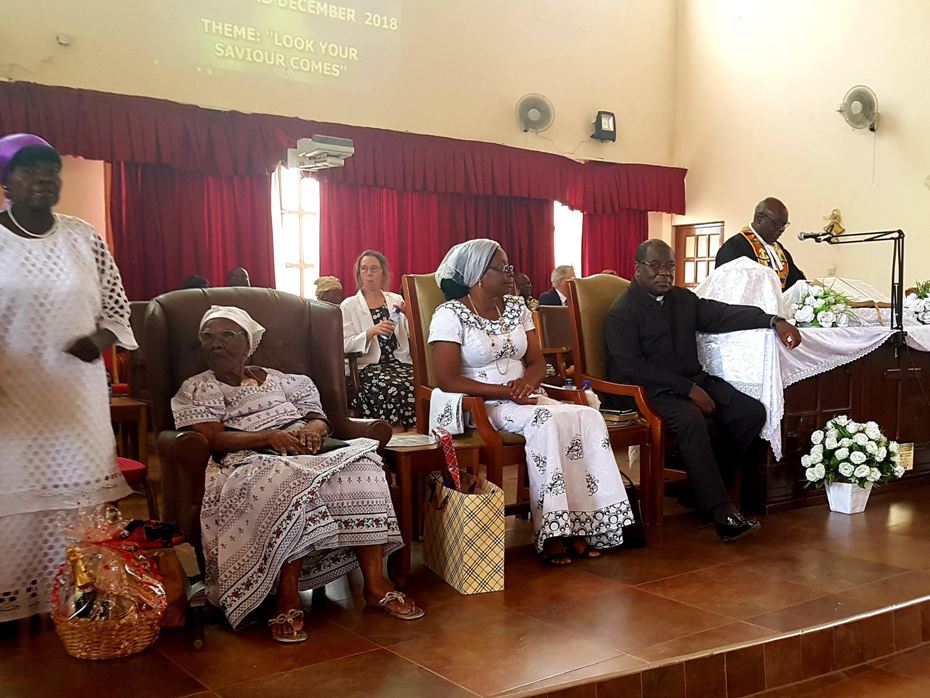Ministering to the Needs of the World: 2018 International Dialogue between the World Communion of Reformed Churches and Classical Pentecostals
Mel Robeck has shared with Pneuma Review the press release from the International Dialogue between the World Communion of Reformed Churches and Classical Pentecostals, which concluded on December 4, 2018.
Representatives of various classical Pentecostal churches and a delegation from the World Communion of Reformed Churches met in Legon, Accra, Ghana, November 29 – December 4, 2018. This meeting was the fifth session of the third round, which is focused on “Ministering to the Needs of the World.”

The participants were photographed on the campus of Trinity Theological Seminary, where the Methodist scholar on Pentecostal and Charismatics, Dr. Kwabena has recently become President. Pictured left to right, row one: Bas Plaisiar, Teresa (Tess) Chai, Jacqui Grey, and Van Johnson. Row two: Karla Koll, Jean-Daniel Plüess, Gabrielle Rácsok, and Setri Nyomi. Row three: David Daniels, Mel Robeck, Hanns Lessing.
At the beginning and end of each day, participants gather to pray, sing, read and reflect upon the Bible together. This time of sharing in spirituality and worship helps to contextualize the discussions that take place, and builds greater community between participants.
This year, the dialogue focused on the significance of eschatology (those things having to do with the end of time and the return of Jesus, which is our blessed hope) to Mission. To open the discussion, the Rev. Dr. Karla Ann Koll (Reformed) and Rev. Dr. Van Johnson (Pentecostal) prepared and presented papers reflective of the teachings of their faith communities on this topic. Participants then raised questions and responded in a free-ranging discussion intended to tease out common interests and common concerns, while noting differences in understanding.
In her presentation, Dr. Koll demonstrated that Reformed Christians, like Pentecostals, anticipate the return of Jesus Christ to bring the Reign of God in its fullness. Their primary focus has been on sharing the Gospel and caring for the lives and well-being of others in ways they believe are in keeping with that Reign. Following the teachings of John Calvin regarding the sovereignty of God, and their belief that God’s redemptive intention encompasses all of creation, they have been less focused upon events surrounding the Second Coming, and more on the call for the Church to minister until Christ’s return. They maintain that the Holy Spirit empowers them both to promote the Gospel, and work to transform culture and society in keeping with Christ’s will.
 Dr. Johnson made the case that both time and space have challenged the way Pentecostals think about and act upon their understanding of eschatology. Pentecostals believe that God has been restoring the purity, passion, and power of the church through the Holy Spirit, in anticipation of the imminent return of Christ and the inauguration of His kingdom. Like the early church, their expectation that time was short before Christ’s return, has motivated much of their mission activity, in which they have emphasized the proclamation of the Gospel to the “lost.” Yet, after a century of existence, Pentecostal views of time are changing, leading to shifts in how they view mission. If they have more time to live and act, their view of the world around them, their space, must be taken more seriously than in the past. While continuing to affirm the soon return of the Lord, their notion of mission has broadened beyond proclamation or evangelization alone, to include other missional activities. Now, mission includes a range of activities extending from evangelism to creation care as signs of the future kingdom.
Dr. Johnson made the case that both time and space have challenged the way Pentecostals think about and act upon their understanding of eschatology. Pentecostals believe that God has been restoring the purity, passion, and power of the church through the Holy Spirit, in anticipation of the imminent return of Christ and the inauguration of His kingdom. Like the early church, their expectation that time was short before Christ’s return, has motivated much of their mission activity, in which they have emphasized the proclamation of the Gospel to the “lost.” Yet, after a century of existence, Pentecostal views of time are changing, leading to shifts in how they view mission. If they have more time to live and act, their view of the world around them, their space, must be taken more seriously than in the past. While continuing to affirm the soon return of the Lord, their notion of mission has broadened beyond proclamation or evangelization alone, to include other missional activities. Now, mission includes a range of activities extending from evangelism to creation care as signs of the future kingdom.


